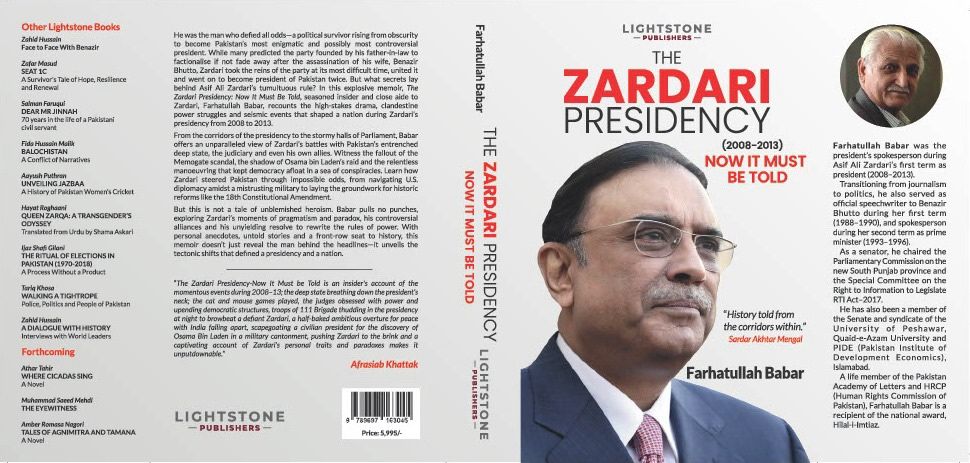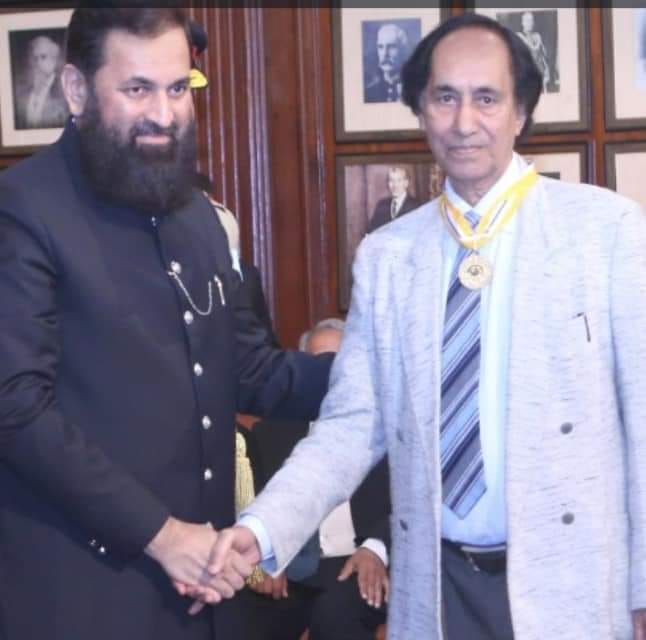Farhatullah Babar's "The Zardari Presidency" Offers Unprecedented Access to Pakistan's Political History
Former Presidential Spokesman Reveals Inside Story of Zardari Era in New Book

KARACHI - In what promises to be one of the most revealing political memoirs in Pakistan's history, former presidential spokesman Farhatullah Babar has lifted the veil on some of the most significant and secretive events during Asif Ali Zardari's presidency. His book "The Zardari Presidency" provides an unprecedented insider's perspective on the complex political maneuvering that shaped Pakistan between 2008 and 2013.
Speaking at the Karachi Press Club during the book's launch, Babar emphasized that his work is not intended as a tribute to any individual personality, but rather serves as a crucial political and historical document. The author, who maintained a daily diary throughout his tenure as presidential spokesman, has structured his observations into ten detailed chapters that chronicle the pivotal moments, decisions, meetings, and crises that defined this tumultuous period in Pakistani politics.
The Memogate Scandal: A Political Suicide Attack
Perhaps the most explosive revelation in Babar's book concerns the infamous Memogate scandal, which the author characterizes as nothing short of a "political suicide attack." The scandal, which erupted in 2011, involved allegations that the Pakistani government had sought American help to prevent a military coup following the killing of Osama bin Laden.
Babar provides a particularly damning assessment of then-opposition leader Nawaz Sharif's role in the affair. According to the book, Sharif personally donned a black coat and filed a petition in court against Zardari regarding the memo scandal, only to later acknowledge the entire episode as a mistake. The author argues that the consequences of this "mistake" were borne not just by Zardari personally, but by the entire Pakistani state, fundamentally undermining institutional trust and credibility.
This revelation is particularly significant because it demonstrates how political miscalculations can have far-reaching consequences beyond individual careers, affecting the stability of democratic institutions themselves. The Memogate affair became a defining moment that tested the relationship between civilian leadership and military establishment, with reverberations that continue to influence Pakistani politics today.
Foreign Policy Leadership Under Pressure
The book sheds new light on several crucial foreign policy challenges that defined the Zardari presidency, most notably the Raymond Davis case. Davis, a CIA contractor, killed two Pakistani citizens in Lahore in 2011, creating a major diplomatic crisis between Pakistan and the United States. According to Babar's account, the American ambassador was visibly distressed about the case and sought direct meetings with President Zardari to resolve the matter.
During these discussions, the Prime Minister delivered a clear message that the concept of a "state within a state" would not be tolerated. This stance reflects the civilian government's attempt to assert authority over Pakistan's complex relationship with American intelligence operations on Pakistani soil.
Babar reveals that President Zardari personally led Pakistan's foreign policy on several critical fronts during this period. Beyond managing the fallout from the Davis case, Zardari articulated clear positions on nuclear policy with India and attempted to maintain delicate balance between regional rivals Saudi Arabia and Iran. While these foreign policy positions generated severe criticism from various quarters, Zardari demonstrated remarkable consistency and persistence in maintaining Pakistan's strategic autonomy.
The author's observations provide valuable insight into how a civilian leader navigated the treacherous waters of regional geopolitics while facing constant domestic pressure. This aspect of the book is particularly important for understanding how democratic leadership functions under extreme stress, especially when dealing with security establishment concerns and international pressures simultaneously.
The Musharraf Ouster: Strategic Political Maneuvering
One of the most fascinating political episodes detailed in the book involves the strategic maneuvering that led to Pervez Musharraf's resignation from the presidency. According to Babar's account, Zardari conducted this operation with remarkable political acumen, first carefully gauging the reaction of Army Chief General Ashfaq Parvez Kayani before making any decisive moves.
The sequence of events reveals sophisticated political planning. After ensuring that Kayani would not oppose Musharraf's removal, and even receiving a suggestion from the army chief that Aftab Shaban Mirani should become the next president, Zardari orchestrated a coordinated campaign. He instructed trusted party leaders to present resolutions in provincial assemblies demanding Musharraf's impeachment, while simultaneously sending a stark ultimatum through Major General (retired) Mahmood Ali Durrani: resign or face impeachment proceedings.
Initially, Musharraf resisted these pressures, but within weeks, he capitulated and submitted his resignation. This episode demonstrates how effective political strategy requires not just vision but also careful timing, coalition building, and understanding of institutional dynamics. The fact that Zardari secured military acquiescence before proceeding shows his appreciation for the complex civil-military balance that has historically dominated Pakistani politics.
Presidential Ambitions and Party Politics
The book contains a particularly amusing anecdote about presidential ambitions that reveals the underlying tensions within the Pakistan Muslim League-Nawaz and Pakistan People's Party alliance during the transition period. Despite being in coalition with the PPP at the time, Nawaz Sharif harbored ambitions for the presidency himself.
During an informal conversation, when Sharif told Zardari that "my party thinks I should become president," Zardari reportedly smiled and replied, "my party thinks the same thing [about me]." This exchange, while lighthearted on the surface, illustrates the fundamental competitive dynamics that existed even within political alliances, and how personal ambitions often complicate party relationships.
This incident provides insight into the personality-driven nature of Pakistani politics, where individual leaders often embody their parties' aspirations and where personal chemistry between leaders can significantly impact broader political arrangements.
Judicial Relations and Institutional Conflicts
The fourth chapter of Babar's book focuses extensively on the complex relationship between the Zardari administration and the judiciary, particularly regarding Chief Justice Iftikhar Muhammad Chaudhry. The author reveals that neither Benazir Bhutto nor Asif Ali Zardari ever publicly supported Justice Chaudhry during the lawyers' movement that sought his restoration.
According to Babar, Zardari believed that Justice Chaudhry was using the banner of "independence" to pursue personal and institutional interests rather than genuine judicial reform. This perspective provides a counter-narrative to the popular understanding of the lawyers' movement, suggesting that the civilian leadership had legitimate concerns about judicial overreach disguised as independence.
The book details the intense pressure Zardari faced during the Long March from Lahore that demanded Chaudhry's restoration. Not only did political parties and civil society groups pressure the president, but even his own cabinet members and the Prime Minister urged him to acquiesce to the demands. Despite this overwhelming pressure, Zardari initially remained steadfast in his position.
The dramatic climax came on the night when the Long March approached Islamabad, and the Triple One Brigade was deployed within the President House. While this deployment created impressions of possible military intervention, Babar clarifies that this was not the case, though the very appearance of such measures demonstrates the extreme tensions that existed during this constitutional crisis.
Personal Reflections and Political Observations
Throughout the book, Babar provides candid personal reflections that humanize the political process while maintaining analytical distance. He admits that initially, he doubted whether Zardari would be able to complete his constitutional term, given the numerous crises and challenges facing the presidency. However, he acknowledges that Zardari handled these situations with remarkable patience and perseverance.
The author includes a particularly telling personal anecdote where Zardari would complain to him, saying "you don't consider me a leader either." This admission reveals the human side of political leadership and the personal cost of bearing responsibility during times of intense criticism and skepticism.
Babar also offers broader observations about Pakistani political culture, noting that "politicians face severe accountability while state institutions face no accountability." This observation strikes at the heart of Pakistan's democratic challenges, where elected officials are subject to intense scrutiny and criticism while military and bureaucratic institutions often operate with impunity.
The author suggests that this imbalance creates a persistent "cat and mouse game" in politics that undermines transparency and public trust in democratic processes. This analysis provides valuable context for understanding why civilian governments in Pakistan often struggle to establish effective governance while facing constant institutional challenges.
India Policy and Strategic Risks
One of the most controversial revelations in the book concerns Zardari's approach to India policy. According to Babar, President Zardari made a "no first attack" offer to India, which subsequently produced "terrifying consequences" for Pakistan's strategic position. While the author doesn't elaborate extensively on these consequences, this revelation suggests that Zardari's peace overtures may have been perceived as weakness by various segments of Pakistan's security establishment.
This disclosure is particularly significant because it touches on one of the most sensitive aspects of Pakistani foreign policy - the relationship with India and the role of nuclear deterrence in maintaining strategic balance. The suggestion that peace initiatives could produce negative consequences reflects the complex calculations involved in South Asian security dynamics.
Historical Significance and Documentary Value
The book's publication by Oxford University Press adds to its credibility as a serious historical document. Amina Syed, head of Oxford University Press, emphasized at the launch that this represents the first time in Pakistan's political history that someone who was both a participant in and close observer of presidential decision-making has provided such detailed insights into the inner workings of the highest office.
The inclusion of perspectives from leaders like Sardar Akhtar Mengal and Afrasyab Khattak, who describe the work as a genuine glimpse into "power politics" and a documentary tradition, further validates its importance as a historical record.
Babar reveals that Benazir Bhutto had also encouraged him to write a book, to which he had responded that he would only do so when he was no longer holding an official position in the party. This commitment to maintaining some distance from active politics while writing adds credibility to his observations and analysis.
Broader Implications for Democratic Governance
Beyond its immediate revelations about the Zardari presidency, Babar's book offers valuable insights into the challenges facing democratic governance in Pakistan. The detailed account of how a civilian president navigated complex relationships with the military establishment, judiciary, opposition parties, and international partners provides a case study in democratic leadership under extreme pressure.
The book demonstrates how personal relationships, institutional constraints, public opinion, and international pressures all converge to shape presidential decision-making. It shows how democratic leaders must constantly balance competing demands while maintaining constitutional authority and political legitimacy.
The work also illustrates the importance of institutional memory in democratic systems. By documenting these events while they were fresh and providing detailed context for major decisions, Babar has created a resource that will be invaluable for future historians, political scientists, and practitioners seeking to understand this crucial period in Pakistan's democratic evolution.
"The Zardari Presidency" is now available at bookstores nationwide and represents essential reading for anyone seeking to understand Pakistani politics from an insider's perspective. The book stands as both a historical document and a contribution to the broader understanding of how democratic leadership functions in complex, challenging environments.
For scholars and students of Pakistani politics, the book provides unprecedented access to the decision-making processes at the highest levels of government during a period of significant constitutional and political transformation. For general readers interested in political biography and contemporary history, it offers engaging insights into personality-driven politics and the human dimensions of power.
The timing of the book's publication, years after the events it describes, allows for more objective analysis while memories remain vivid and relevant documents are still accessible. This balance between immediacy and reflection makes Babar's work a valuable contribution to Pakistan's political literature and historical record.


No comments yet.